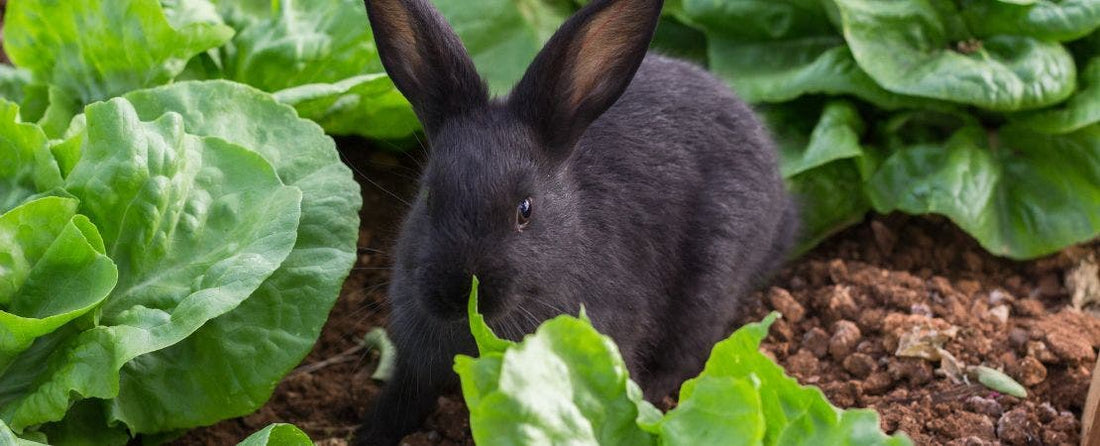
Tips to Discourage Rabbits from Snacking In Your Garden
Share
Rascally Rabbits: How to Stop Rabbits From Eating Plants
There is nothing more disheartening to gardeners than discovering that whole sections of their beautiful spring gardens are ravaged or bare. Yesterday, the beet leaves were just about large enough and you had just set out the cauliflower and broccoli plants from their winter homes indoors. The peas were thriving and giving you visions of spring peas with a little fresh mint. Now what you see is empty space. If you look closely, you might see the stem neatly cut off at ground level. There’s only one culprit for every gardener’s worst nightmare—rascally rabbits.
Rabbits leave a pretty obvious calling card, as they don’t tear and shred the plants, but neatly bite them off. If you check where your plants used to be, you will probably see round, pea-sized droppings. You may even see the footprint of their large back feet. One rabbit can eat entire sections of your garden overnight. If a family of rabbits has invaded your garden, they quickly change from cute little bunnies into destructive marauders!
There are specific steps you can take to keep them from your garden. The best idea is to use several methods at the same time. Remember to keep changing your tactics because rabbits learn what can actually threaten them and what is non-threatening. Here are some ideas.
1. Fencing
The best protection for your garden is fencing. It must be a metal fence and needs to be at least two feet above ground (preferably three feet) so the rabbits can’t jump over the fence. Here is the tricky part: The fence has to be six inches to twelve inches in the ground to keep the rabbits from burrowing under the fence.
It’s easiest to build a fence if you have a raised bed garden. Attach your fencing around the structure to keep the rabbits out. If your garden is ground level, this will be a labor-intensive process, but your fence should last years and protect your garden from the rabbits. Use heavy wire fencing and keep the openings no greater than one inch across to stop the baby rabbits. You can also protect your young trees and shrubs with caging and netting.
2. Remove Habitat
Rabbits will usually stay in their home during the day and come out to feed at night. They love to live in brush piles or thick undergrowth. Good housekeeping in your yard will go a long way, so remove any brush piles, tall grasses and rocky areas.
Rabbits will also burrow under sheds, porches or other structures. If you find a burrow leading under a structure, fill it in as soon as possible. Check for a second entrance, as rabbits usually have two means of escape. Some of these areas may be an integral part of your landscape, but you can minimize the rabbit population by eliminating as many potential rabbit home sites as possible.
3. Repellent Products
Rabbits are low on the food chain (no offense, rabbits!). They are a main food source for hawks, eagles and owls, as well as coyotes, foxes, raccoons and other predators. They may even be endangered by dogs and cats. This works to our advantage, as we can use scents from those natural predators to keep our gardens safe.
Garden pest control products containing ingredients like dried blood and coyote urine will keep the rabbits away. Switch them up to keep the rabbits from getting used to the smell and reapply frequently–especially after rain.
4. Choose Garden Plants Carefully
Vegetable plants are not the only part of your garden in danger from the rabbits. Your flowers are just as vulnerable, and it is highly unlikely that you will want a three-foot fence surrounding your flowers. The best strategy is to plant flowers that rabbits don’t like, like vincas.
Rabbits don’t seem to like this beautiful plant, which can be grown in the ground as well as in containers. Plant the vinca seeds indoors and move them outside after the last frost. Geranium seeds planted indoors will also be a good choice for the gardener with rabbit problems. If you love lavender, you’ll love this. Lavender deters rabbits in two ways—the plant itself is not tasty to the rabbits and its strong scent will mask the scent of flowers that rabbits do like. Lavender seeds planted indoors in winter will be ready to deter the rabbits when transplanted outdoors. Other flowering plants to consider are daffodils, irises, marigolds, daylilies and foxglove.
Rabbits are a part of nature and they’re not going away anytime soon. However, these methods should protect your plants and maintain the balance between their needs and ours.